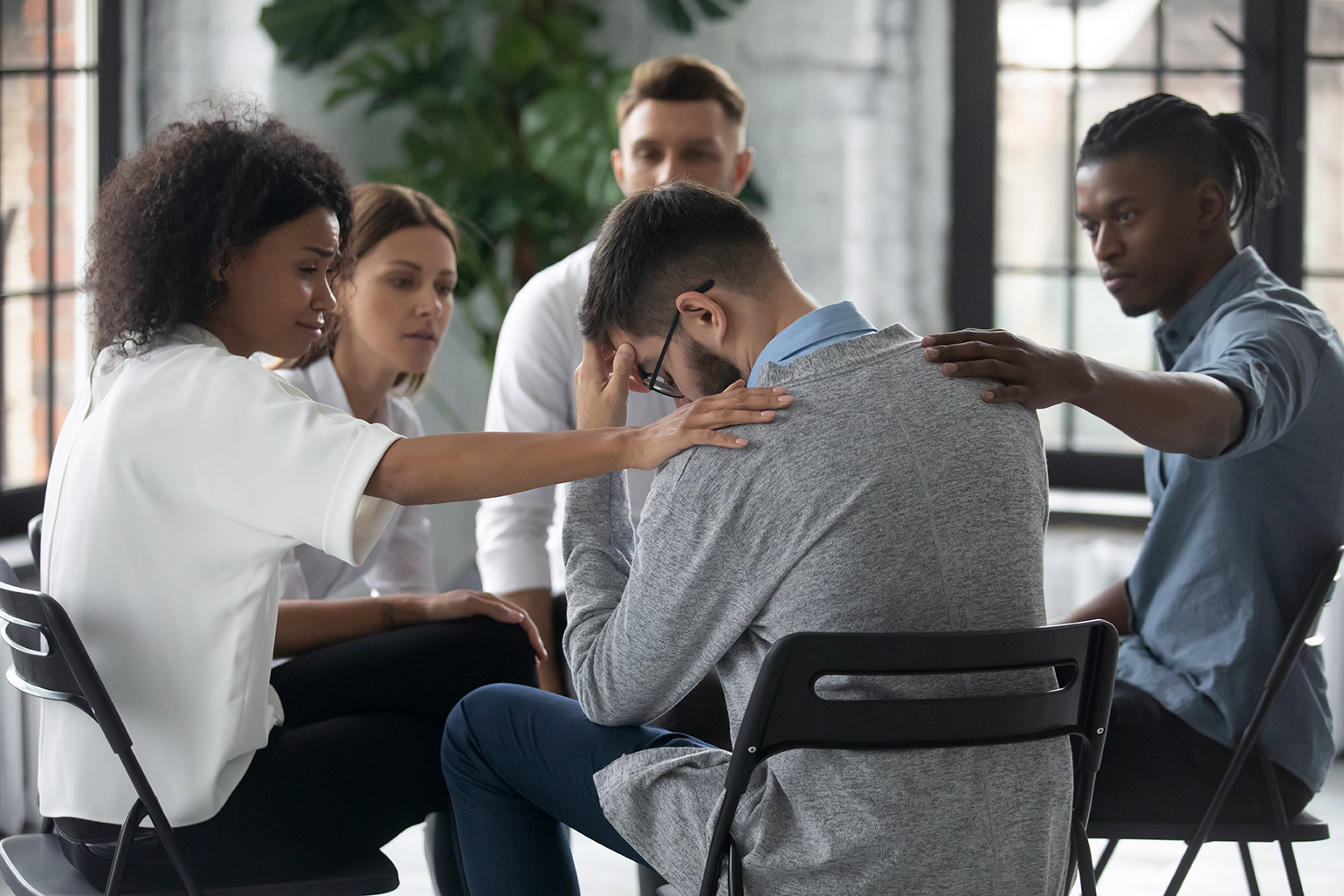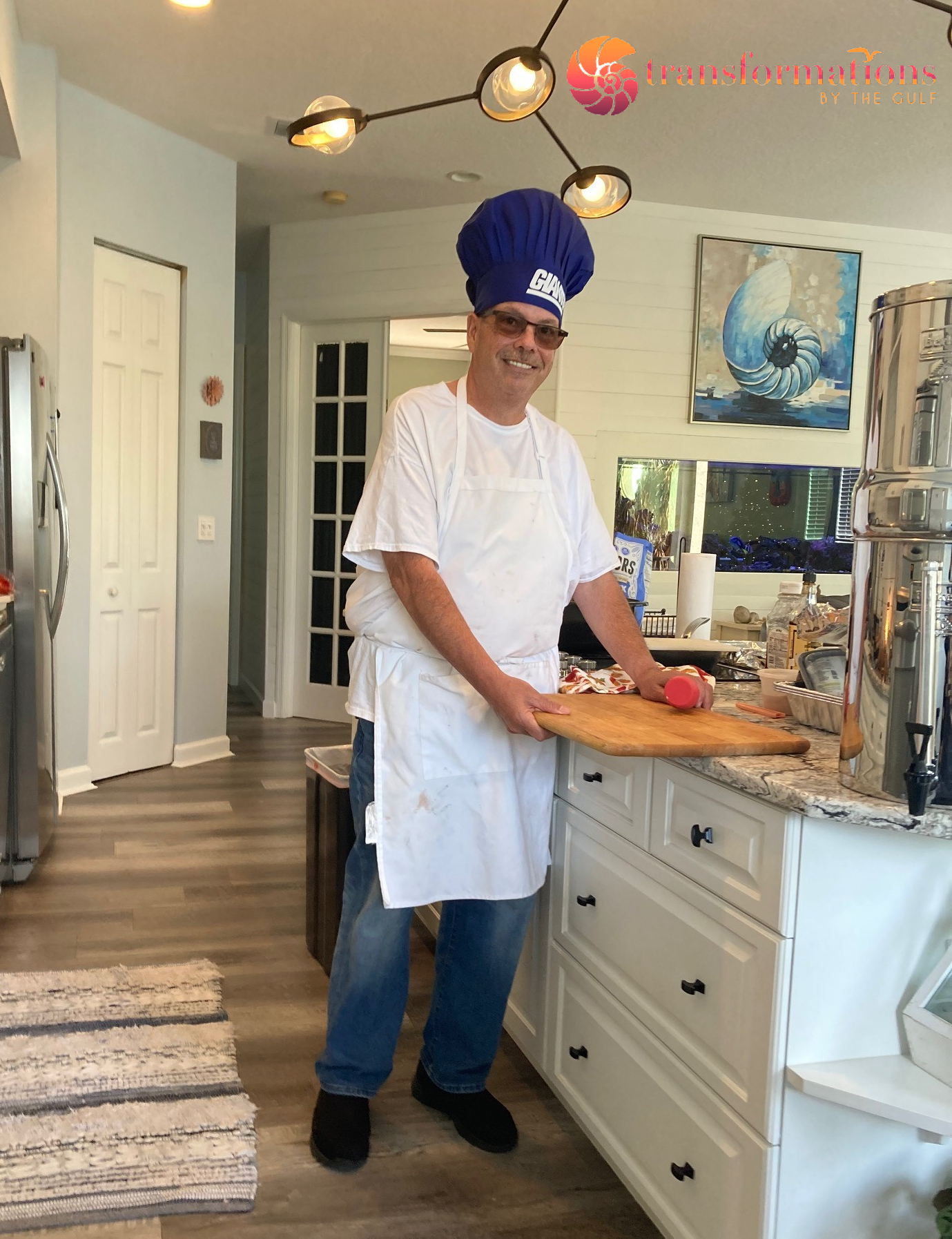Will Insurance Pay for Addiction Treatment?
Will Insurance Pay for Addiction Treatment?
Which Insurance Providers does Transformations accept?
It's quite reasonable to wonder if your insurance is accepted when finding a treatment program for addiction you may ask yourself, "where is a Florida Addiction Rehab that accepts Aetna?", "where is a Florida Addiction Rehab that accepts Cigna?", "where is a Florida Addiction Rehab that accepts Blue Cross?", "where is a Florida Addiction Rehab that accepts United Healthcare?", "where is a Florida Addiction Rehab that accepts Harvard Pilgrim?", "where is a Florida Addiction Rehab that accepts Florida Blue?", or other insurances. We make it easy to get verified for your coverage. Simply call our addiction support specialists at (727)498-6498 and they can answer insurance questions with no pressure.
Ready For Help with Your Addiction Problem?
If you are using drugs or alcohol, you may have an addiction that requires professional help. Find out At Transformations by the Gulf How Mind-Altering Substances Work, we offer programs that let you continue on with your daily life by living at home but coming in for the treatment you need. Transformations by the Gulf provides a secure and supportive environment to address negative emotions and develop coping mechanisms essential for the recovery journey. If you or someone you know is struggling with an addiction to drugs or alcohol, call us today at (727)498-6498.
Being Supportive to an Addict After Rehab, are you struggling with addiction and want to learn more? Check out our page on addiction treatments.
If you or a loved one needs treatment and rehabilitation for substance use, Transformations by the Gulf can help. Find out more information from Psychology Today!
Connection Between Impulse Control and Addiction
Connection Between Impulse Control and Addiction
Causes of Impulse Control Disorders
Impulse Control Disorders and Substance Abuse
Help is Available
It’s important to seek the advice and counsel of mental health professionals when suffering from an impulse control disorder. Fortunately, the expert counselors and therapists at Destinations for Teens have extensive experience in dealing with disorders of all types. Our focus is on helping teens and adolescents find healing. Get in touch with our professional staff to find out the best options for successful treatment. Some of our therapeutic services include:
- Yoga therapy
- Art therapy
- Group therapy
Ready For Help with Your Addiction Problem?
If you are using drugs or alcohol, you may have an addiction that requires professional help. Find out At Transformations by the Gulf How Mind-Altering Substances Work, we offer programs that let you continue on with your daily life by living at home but coming in for the treatment you need. Transformations by the Gulf provides a secure and supportive environment to address negative emotions and develop coping mechanisms essential for the recovery journey. If you or someone you know is struggling with an addiction to drugs or alcohol, call us today at (727)498-6498.
Being Supportive to an Addict After Rehab, are you struggling with addiction and want to learn more? Check out our page on addiction treatments.
If you or a loved one needs treatment and rehabilitation for substance use, Transformations by the Gulf can help. Find out more information from Psychology Today!
What Addiction Treatment is Like
What Addiction Treatment is Like
Treatment of Addictive Disorders
- Detoxification and medical management of withdrawal symptoms, if needed;
- a comprehensive evaluation of the nature of use, and strengths and needs of the individual which results in a diagnosis;
- an individualized treatment plan which is developed with the patient and is modified as the individual progresses;
- pharmacological therapy, when appropriate;
- monitoring of continued abstinence from alcohol and/or other substances;
- vocational and educational assistance;
- cognitive and behavioral therapy;
- clinical case management;
- continuing care; and
- self-help or peer support as a complement to professional treatment
- Understand the relevant issues associated with the disease as it affects their lives and the lives of those around them;
- Understand the physical impact of chemicals and the implications of addiction on brain functioning;
- Learn and practice the mechanisms, attitudes, skills and behaviors necessary to sustain the positive effects of treatment;
- Develop the capacity or potential to practice normal life activities with responsibility;
- Recognize the personal signs, symptoms, circumstances, and triggers of relapse and know how to respond; and
- Develop and sustain a social support network that will foster and reinforce ongoing recovery.
Ready For Help With Your Addiction Problem?
If you are using drugs or alcohol, you may have an addiction that requires professional help. Find out At Transformations by the Gulf How Mind-Altering Substances Work, we offer programs that let you continue on with your daily life by living at home but coming in for the treatment you need. Transformations by the Gulf provides a secure and supportive environment to address negative emotions and develop coping mechanisms essential for the recovery journey. If you or someone you know is struggling with an addiction to drugs or alcohol, call us today at (727)498-6498.
Being Supportive to an Addict After Rehab, are you struggling with addiction and want to learn more? Check out our page on addiction treatments.
If you or a loved one needs treatment and rehabilitation for substance use, Transformations by the Gulf can help. Find out more information from Psychology Today!
Childhood Trauma Connection to Addiction
Childhood Trauma Connection to Addiction
What is Childhood Trauma?
Trauma occurs due to events that cause physical or emotional harm to a child, leaving them scared, confused, helpless, and betrayed. This can lead to a breakdown of trust in parental or authority figures. If the child lacks the ability or support to cope with such events, a trauma disorder may develop.
Childhood trauma can stem from various sources, including different forms of child abuse like physical, psychological, and sexual abuse. Other causes of childhood trauma may include emotional or physical neglect, the loss of a parent or loved one, bullying, or experiencing a serious illness. Additionally, being part of or witnessing a severe accident, acts of war, domestic violence, natural disasters, community violence, or school violence can also lead to childhood trauma.
Additional experiences that cause trauma in children include:
- Having a parent who used drugs in the home.
- Having a mentally ill parent in the home.
- Having a parent in jail or prison.
- Criminal behavior in the living environment.
The Effects of Childhood Trauma on the Brain
Childhood trauma can have a major effect on the developing brain, raising the likelihood of addiction in later years. According to Brain Facts, trauma can cause physical harm to a child's brain, leading to toxic stress. This toxic stress, when intense, lasting, and frequent, can reshape and modify various parts of the brain through neuroplasticity. These modifications impact the functioning of the brain's prefrontal cortex, amygdala, and anterior cingulate cortex, influencing the individual's capacity to manage and control their emotions.
How Does Childhood Trauma Affect the Adult Brain?
There are many ways that childhood trauma affects the adult brain. Here are several of them.
- An ongoing activation of the amygdala raises the risk of developing both mental health disorders and substance use disorders simultaneously.
- Repetitive traumatic experiences can cause the amygdala to be overstimulated, resulting in a constant state of fear, anxiety, and hypervigilance for the individual.
- Childhood trauma can activate the brain's fight-or-flight reaction in the absence of a threat.
- When the fight-or-flight response is activated in non-threatening situations, the individual experiences hyperarousal, characterized by an excessive startle reaction, sleep disturbances, and increased irritability.
- Childhood trauma often leads adults to avoid places, events, things, or situations that trigger memories of the traumatic event. This can disrupt their daily functioning.
- Childhood trauma frequently leads to negative self-talk and a negative self-image, as the person holds a negative perception of themselves.
Why Does Trauma Often Lead to Addiction?
Individuals who have undergone childhood trauma frequently resort to alcohol consumption or drug use as a form of self-medication to alleviate the physical and emotional distress resulting from their traumatic experiences in childhood. However, the solace derived from substance use is transient. Persistent attempts to seek solace through substance use can rapidly lead to addiction, adversely affecting the individual's physical and mental well-being. Ultimately, substance use disorders exacerbate the impact of trauma and amplify symptoms of trauma-related disorders.
If you are using drugs or alcohol, you may have an addiction that requires professional help. Find out At Transformations by the Gulf How Mind-Altering Substances Work, we offer programs that let you continue on with your daily life by living at home but coming in for the treatment you need. Transformations by the Gulf provides a secure and supportive environment to address negative emotions and develop coping mechanisms essential for the recovery journey. If you or someone you know is struggling with an addiction to drugs or alcohol, call us today at (727)498-6498.
Being Supportive to an Addict After Rehab, are you struggling with addiction and want to learn more? Check out our page on addiction treatments.
If you or a loved one needs treatment and rehabilitation for substance use, Transformations by the Gulf can help. Find out more information from Psychology Today!
How Mind-Altering Substances Work
How Mind-Altering Substances Work
What is Chemical Dependency?
Chemical dependency is a condition marked by dependence on substances that alter mood or mind, like alcohol, illicit drugs, and specific prescription medications. It is a long-lasting, advancing, and possibly life-threatening illness. Chemical dependency can negatively impact your physical health, career, familial connections, and social relationships.
How Do Alcohol and Other Mind-Altering Drugs Work?
Alcohol and drugs are substances that alter bodily functions. When introduced into the body (typically through ingestion, inhalation, or injection), they enter the bloodstream and circulate throughout the body. These substances can impact sensory perception, alertness levels, and pain sensitivity in the brain. The effects of drugs vary based on factors such as the type of drug, dosage, frequency of use, rate of absorption into the brain, and concurrent consumption of other substances. Additionally, individual differences in body composition and chemistry can influence the effects. Prolonged use of psychoactive substances leads to changes in brain activity, causing a dependence on these substances for normal functioning rather than just for pleasure. This reliance signifies a state of chemical dependency.
Get Help Today
If you are using drugs or alcohol, you may have an addiction that requires professional help. Find out At Transformations by the Gulf How Mind-Altering Substances Work, we offer programs that let you continue on with your daily life by living at home but coming in for the treatment you need. Transformations by the Gulf provides a secure and supportive environment to address negative emotions and develop coping mechanisms essential for the recovery journey. If you or someone you know is struggling with an addiction to drugs or alcohol, call us today at (727)498-6498.
Being Supportive to an Addict After Rehab, are you struggling with addiction and want to learn more? Check out our page on addiction treatments.
If you or a loved one needs treatment and rehabilitation for substance use, Transformations by the Gulf can help. Find out more information from Psychology Today!
Recovery Dharma in Florida
Recovery Dharma in Florida
There are several growing recovery-based programs or additions found today. Recovery Dharma in Florida is one of them. One recovery program that offers an approach to recovery based on Buddhist principles is known as Recovery Dharma. Recovery Dharma is peer-led and non-theistic. They welcome all those who wish to pursue recovery as part of our community.
The readings of Recovery Dharma highlight the basic principles and practices of the program. Each concept provides an opportunity to deepen understanding, explore personal inquiry, and connect with others.
Recovery Dharma in Florida; Recovery Dharma is founded on, and inspired by, Buddhism that originated in India and later on flourished in other regions of Asia (e.g., South Asia, East Asia, Southeast Asia, Central Asia). We deeply appreciate the Buddhist heritage that was protected and freely offered by the ancestors of these cultures.
The Practice Overview:
Renunciation: We commit to the intention of abstinence from alcohol and other addictive substances and behaviors.
Meditation: We commit to the intention of developing a daily meditation practice.
Meetings: We attend recovery meetings and commit to becoming an active part of the community, offering our own experiences and service wherever possible.
The Path: We commit to deepening our understanding of the Four Noble Truths and to practicing the Eightfold Path in our daily lives.
Inquiry and Investigation: We explore the Four Noble Truths as they relate to our addictive behavior through writing and sharing in-depth, detailed Inquiries.
Sangha, Wise Friends, Mentors: We cultivate relationships within a recovery community, to both support our own recovery and support the recovery of others.
Growth: We continue our study of these Buddhist principles and undertake a lifelong journey of growth and awakening.
For more information about Recovery Dharma visit recoverydharma.org
Transformations by the Gulf Addiction Treatment Develops Coping Skills and Shows You How to Use Them.
Transformations by the Gulf Addiction Treatment devotes its efforts to caring for and helping heal the whole person. It is through this pathway that real change can be made, and wellness restored. Learning and practicing coping skills for addiction recovery is a core treatment focus in our program. For more detail about the program, please reach out to the team today at (727)-498-6498.
Staying Connected in Recovery
Staying Connected in Recovery
Staying Connected in Recovery is very important. The process of addiction can often lead to disconnecting from others. Some individuals would say that the opposite of addiction is sobriety, however, it is recovery. What is recovery? Recovery is a process of change through which people improve their health and wellness, live self-directed lives, and strive to reach their full potential. Even people with severe and chronic substance use disorders can, with help, overcome their illness and regain health and social function. A key component is social connection.
How to Stay Connected in Recovery
Whatever the origins of your addiction are, it is undeniable that having a supportive, caring community is instrumental in recovery. We simply need others around us who we can connect with and relate to. Some will be other recovery addicts or alcoholics, who have their background and have come into a community dedicated to healing. Others may be co-workers, friends, mentors, family members, or anyone we learn to trust and rely upon for companionship and community. It helps to share our experiences with others and to avoid old patterns and behaviors.
Attend Meetings and Work on a Program. It doesn’t have to be a 12-step program, although that’s a great place to start. There are a wide variety of recovery-based programs these days including AA, NA, Recovery Dharma, Smart Recovery and so many more. Find a program that works for you.
Find a Healthy Hobby. Joining a bridge club or a knitting circle taking riding lessons or learning tai chi will automatically throw you in with a group of like-minded people with whom you can form new and hopefully lasting connections.
Be of Service. It doesn’t have to be in the 12-step rooms, although that’s a great place to start. Serving others out of a genuine desire to be helpful will increase your sense of connectedness, no matter where in the community you decide to serve.
Transformations by the Gulf Addiction Treatment Develops Coping Skills and Shows You How to Use Them.
Transformations by the Gulf Addiction Treatment devotes its efforts to caring for and helping heal the whole person. Staying Connected in Recovery is possible with Transformations by the Gulf. It is through this pathway that real change can be made, and wellness restored. Learning and practicing coping skills for addiction recovery is a core treatment focus in our program. For more details about the program, please reach out to the team today at (727)-498-6498.
Benefits of Exercise in Addiction Treatment
Benefits of Exercise in Recovery
Experts believe that regular physical activity can act as a healthy building block for avoiding addictive substances. That’s because exercise and substance abuse work on similar parts of your brain. They both activate your reward center, which triggers the release of dopamine and serotonin.
How Does Exercise Affect Your Mind and Body?
When you’re recovering from alcohol or drug addiction, exercise is beneficial for both your body, and your mind. Physical and mental health are both connected, and exercising gives us the opportunity to improve both at the same time. Let’s take a closer look at the physical and mental health advantages that come with regular exercise.
Physical Health Benefits
Physical activity can help you maintain a healthy weight and strengthen your body. Exercise is helpful because weight struggles are sometimes connected with substance use recovery and often times experience an increase in appetite in early recovery.
The physical health benefits of exercise extend far beyond managing weight. According to the Centers for Disease Control and Prevention (CDC), getting active for at least 150 minutes per week can actually reduce the risk of diabetes, cardiovascular disease, some types of cancers and other chronic diseases. Routine exercise can also increase the brain’s amount of new nerve connections being formed, which helps the brain’s healing process from the harmful physiological effects of frequent substance use.
Mental Health Benefits
In addition to the physical health benefits, regular exercise offers many psychological benefits. When you engage in physical activity, your body releases endorphins. Endorphins interact with your brain receptors to decrease your perception of pain, much like morphine does. The natural activation of these receptors through physical exercise doesn't lead to addiction. This process can result in a lot of positive feelings of euphoria after each workout.
Forming good mental health habits and coping skills is especially important for those in recovery because mental health disorders like depression and anxiety can often co-occur with addiction. Exercise during recovery can be a necessary component in improving mental health and generating a more positive outlook on life. Other mental health benefits of exercise include sharper thinking, learning and judgment skills.
Want to learn more about our yoga therapy or need help dealing with addiction? Contact us to learn more about our treatment services and get help today.
If you or someone you know would like to know more about Transformations by the Gulf Substance Abuse Treatment Center Give us a Call 24/7 (727)498-6498
The success of a person’s recovery depends on the level of personalized treatment provided. It is important to find an addiction treatment program that works. When we say our treatment is individualized, we mean that we craft a program that is tailored to address the client’s unique physical, mental and emotional needs.
In the client’s first 24 hours with us, we’ll evaluate their current state and work to understand what challenges they need to overcome. They’ll also have an initial session with our doctor and meet with one of our licensed mental health professionals.
After the initial evaluations, we’ll design a treatment plan with the sole mission of helping the client overcome and heal from addiction. Their program will focus on things such as:
- Addressing and Identifying root causes of addiction.
- Creating a support system.
- Developing healthy stress management techniques.
- Eliminating Substance use.
- Learning how to communicate emotions effectively.
- Maintaining a healthier lifestyle.
- Repairing damaged relationships.
Our Facility is near the beach and offers a comfortable setting for substance abuse treatment and recovery.
What a Day is Like in Our Treatment Facility.
Why Transformations by the Gulf?
Cupping Therapy in Addiction Recovery
What is Cupping Therapy?
Cupping therapy is an ancient form of alternative medicine. A therapist will put special cups on your skin for a few minutes which creates a suction. The suction increases blood flow to the affected area. Cupping therapy is used for many purposes such as pain reduction, inflammation, blood flow, relaxation, well-being, and as a type of deep-tissue massage. It can ease back pain, neck pain, headaches and other areas. The cups are made from bamboo, glass, earthenware or silicone.
How Does Cupping Therapy Work?
As the air inside of the cup cools down, it creates a sort of vacuum. This causes your skin to get red and rise as your blood vessels expand. The cup is generally left in place for up to 3 minutes. Sometimes therapists use silicone cups, which they can move from place to place on your skin for a massage-like effect. There is also a form called wet cupping which creates a mild suction by leaving a cup in place for 3 minutes. You might get 3-5 cups in your first session.
Cupping Therapy in Addiction Recovery
Because cupping therapy can be utilized for so many different reasons it can have a huge impact on recovery all together. In some cases, people over medicate to decrease pain symptoms which over time can turn into addiction as the medication no longer gives the same effect. Using cupping therapy can help elevate some of the effects of chronic pain by reducing the levels. In other cases, if stress is the primary cause of addiction utilizing a substance as a coping mechanism cupping therapies massage like effect can help reduce stress over a period of time. Utilizing this ancient therapy as a way to combat addiction is becoming more and more common in modern day times as the benefits are vast.
Transformations by the Gulf Addiction Treatment Develops Coping Skills and Shows You How to Use Them.
Transformations by the Gulf Addiction Treatment devotes its efforts to caring for and helping heal the whole person. It is through this pathway that real change can be made, and wellness restored. Learning and practicing coping skills for addiction recovery is a core treatment focus in our program. For more detail about the program, please reach out to the team today at (727) 498-6498
Cooking in Recovery
For those in early recovery, finding new and interesting activities to take part in that does not involve alcohol or drugs can be difficult. It is important to incorporate one or more sober hobbies into your new lifestyle so you can help strengthen your recovery and improve your quality of life. Working on your cooking skills is an excellent way to add a fun and safe hobby into your daily routine while also developing an important life skill. Here are some of the biggest benefits of sober cooking.
Sober Cooking is Good for Your Physical Health
When in active addiction, people tend to neglect their health and wellbeing. This can manifest as poor eating habits, whether it’s eating too much, not eating enough, or choosing processed foods over nutritious foods. One of the best ways to boost your physical health and wellbeing in recovery is to be mindful of what you put in your body. Studies have shown that people who cooked meals for themselves tend to eat more fruits and vegetables and have lower body fat percentages versus those who tend to eat out. In addition to knowing every ingredient that’s going into your food, sober cooking is also a great way to save a little money while improving food quality.
Sober Cooking is Good for Your Mental Health
Poor eating habits can impact your mental health, which is just as important to maintain as your physical health when it comes to preventing relapse. Researchers have found that consuming large amounts of sugar, junk food, processed meats can increase a person’s risk of depression and/or anxiety. When you prepare meals for yourself, it’s much easier to avoid these highly processed pitfalls and incorporate nutritious items like fruits, veggies, whole grains, nuts, and lean meats into your diet.
Sober Cooking Is Good for Your Brain
People in early recovery can often experience post-acute withdrawal syndrome (PAWS), which can cause temporary cognitive impairments such as loss of memory, concentration problems, and brain fog. Sober cooking is an excellent activity for whipping your brain back in shape, as it involves practices several key cognitive skills affected by PAWS. Gathering and preparing ingredients, following a recipe, and working with different types of cooking equipment requires you to sharpen your attention span and improve your concentration. The more you cook, the more exercise you’ll give to your recovering cognition. You can start by making simple dishes for yourself, then work up to more complex meals for friends and family.
Sober Cooking is Good for Socialization
Sober cooking can also help keep you connected with fellowship, friends, and family, which is important in recovery. Making meals with other people can be a positive bonding experience, as it requires working with others to create something delicious you can enjoy together. It’s also an excellent way to get started cooking in recovery as a beginner — you can start off with simple tasks such as cutting veggies or measuring ingredients and learn important tips and tricks from others.
Cooking In Recovery
Recovery is a lifelong important process. While there are many different strategies one can use to stay clean and sober, finding activities that you enjoy and can do with friends is one of the best ways to stay sober. Cooking is one activity that can benefit your health, recovery, and social relationships.
Transformations by the Gulf Addiction Treatment Develops Coping Skills and Shows You How to Use Them.
Transformations by the Gulf Addiction Treatment devotes its efforts to caring for and helping heal the whole person. It is through this pathway that real change can be made, and wellness restored. Learning and practicing coping skills for addiction recovery is a core treatment focus in our program. For more detail about the program, please reach out to the team today at (727)-498-6498.









